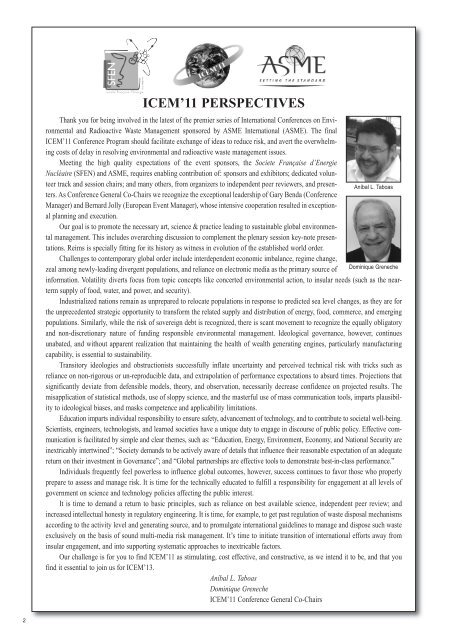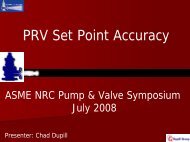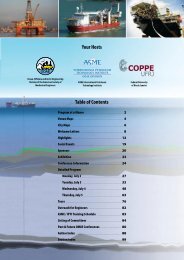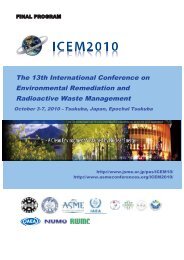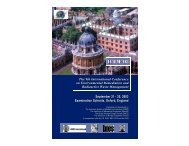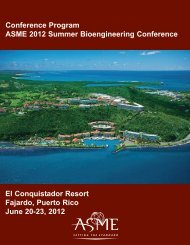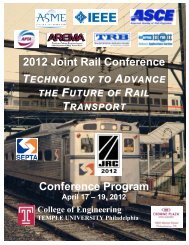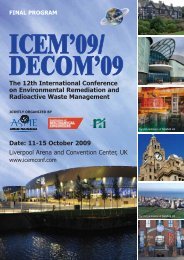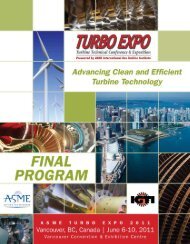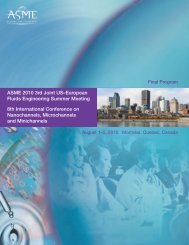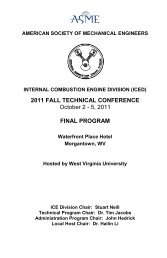ICEM11 Final Program 9.7.11pm_ICEM07 Final Program ... - Events
ICEM11 Final Program 9.7.11pm_ICEM07 Final Program ... - Events
ICEM11 Final Program 9.7.11pm_ICEM07 Final Program ... - Events
Create successful ePaper yourself
Turn your PDF publications into a flip-book with our unique Google optimized e-Paper software.
2<br />
ICEM’11 PERSPECTIVES<br />
Thank you for being involved in the latest of the premier series of International Conferences on Environmental<br />
and Radioactive Waste Management sponsored by ASME International (ASME). The final<br />
ICEM’11 Conference <strong>Program</strong> should facilitate exchange of ideas to reduce risk, and avert the overwhelming<br />
costs of delay in resolving environmental and radioactive waste management issues.<br />
Meeting the high quality expectations of the event sponsors, the Societe Française d’Energie<br />
Nucléaire (SFEN) and ASME, requires enabling contribution of: sponsors and exhibitors; dedicated volunteer<br />
track and session chairs; and many others, from organizers to independent peer reviewers, and presen- Aníbal L. Taboas<br />
ters. As Conference General Co-Chairs we recognize the exceptional leadership of Gary Benda (Conference<br />
Manager) and Bernard Jolly (European Event Manager), whose intensive cooperation resulted in exceptional<br />
planning and execution.<br />
Our goal is to promote the necessary art, science & practice leading to sustainable global environmental<br />
management. This includes overarching discussion to complement the plenary session key-note presentations.<br />
Reims is specially fitting for its history as witness in evolution of the established world order.<br />
Challenges to contemporary global order include interdependent economic imbalance, regime change,<br />
zeal among newly-leading divergent populations, and reliance on electronic media as the primary source of Dominique Greneche<br />
information. Volatility diverts focus from topic concepts like concerted environmental action, to insular needs (such as the nearterm<br />
supply of food, water, and power, and security).<br />
Industrialized nations remain as unprepared to relocate populations in response to predicted sea level changes, as they are for<br />
the unprecedented strategic opportunity to transform the related supply and distribution of energy, food, commerce, and emerging<br />
populations. Similarly, while the risk of sovereign debt is recognized, there is scant movement to recognize the equally obligatory<br />
and non-discretionary nature of funding responsible environmental management. Ideological governance, however, continues<br />
unabated, and without apparent realization that maintaining the health of wealth generating engines, particularly manufacturing<br />
capability, is essential to sustainability.<br />
Transitory ideologies and obstructionists successfully inflate uncertainty and perceived technical risk with tricks such as<br />
reliance on non-rigorous or un-reproducible data, and extrapolation of performance expectations to absurd times. Projections that<br />
significantly deviate from defensible models, theory, and observation, necessarily decrease confidence on projected results. The<br />
misapplication of statistical methods, use of sloppy science, and the masterful use of mass communication tools, imparts plausibility<br />
to ideological biases, and masks competence and applicability limitations.<br />
Education imparts individual responsibility to ensure safety, advancement of technology, and to contribute to societal well-being.<br />
Scientists, engineers, technologists, and learned societies have a unique duty to engage in discourse of public policy. Effective communication<br />
is facilitated by simple and clear themes, such as: “Education, Energy, Environment, Economy, and National Security are<br />
inextricably intertwined”; “Society demands to be actively aware of details that influence their reasonable expectation of an adequate<br />
return on their investment in Governance”; and “Global partnerships are effective tools to demonstrate best-in-class performance.”<br />
Individuals frequently feel powerless to influence global outcomes, however, success continues to favor those who properly<br />
prepare to assess and manage risk. It is time for the technically educated to fulfill a responsibility for engagement at all levels of<br />
government on science and technology policies affecting the public interest.<br />
It is time to demand a return to basic principles, such as reliance on best available science, independent peer review; and<br />
increased intellectual honesty in regulatory engineering. It is time, for example, to get past regulation of waste disposal mechanisms<br />
according to the activity level and generating source, and to promulgate international guidelines to manage and dispose such waste<br />
exclusively on the basis of sound multi-media risk management. It’s time to initiate transition of international efforts away from<br />
insular engagement, and into supporting systematic approaches to inextricable factors.<br />
Our challenge is for you to find ICEM’11 as stimulating, cost effective, and constructive, as we intend it to be, and that you<br />
find it essential to join us for ICEM’13.<br />
Aníbal L. Taboas<br />
Dominique Greneche<br />
ICEM’11 Conference General Co-Chairs


